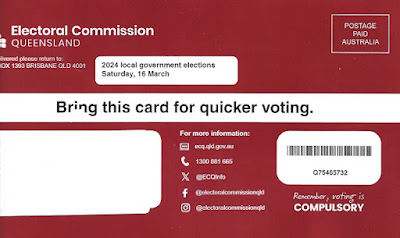 |
| Pic courtesy Leader Today |
Yesterday I went to the state school down the road, and voted in the local government elections, something I've been doing for years, and something entirely unremarkable.
But is it?
We've only to take a glance to the East, across the Pacific at the U.S., or Northwest, to the Russian Federation, to understand that our electoral system is entirely remarkable.
We're not the only country to have compulsory suffrage, but it goes well beyond that.
To use that much-maligned "mutual obligation" term, if the law demands that you vote, it has to provide you the facility and infrastructure to do so. Hence, state and federal electoral commissions, regulated boundaries, and a standardised and transparent vote counting process have been developed over the years.
The foundation of our system is the maintenance of an up-to-date electoral roll. We don't always appreciate the fact that the maintenance of this critical data is humming away quite efficiently in the background, except perhaps when we receive the note in our letterbox reminding us that an election is on the way, and we have to vote.
People who arrive at the age to vote are also encouraged to enrol, although many don't follow through. That seems to be changing, which can only be a good thing.
Enrolling to vote is encouraged at school, and most young people in my experience are enthusiastic first-time voters. I certainly was, when my first opportunity to vote came up at the 1969 Federal election. At the time, I was at the Jungle Training Centre at Canungra, preparing as a conscript, for operational service in Vietnam.
I was, to say the least, disappointed, when I went to the orderly room seeking transport to Canungra State School to vote, only to be told that if I left the centre, I'd be charged with being AWOL*.
Somehow, the notion that we were ostensibly fighting for democracy seemed lost on the army at the time.
This experience has driven home to me the value of our system, as I was voting for a decision about my immediate future, and I was given no say in it. I wonder how many of the 200 National Servicemen who died in Vietnam actually got to vote on the issue?
Contrasting our system with that in the "democracy" across the Pacific is revelatory. The quotes are intentional, by the way, as the US is not a democracy, but a constitutional republic.
It's electoral college system, the history of the disenfranchisement of minorities, and its bipartisan tradition of electoral gerrymandering are well known, although not always well understood outside of the USA.
The fact that 62% of US voters turned out at the 2020 presidential poll, gives the lie to an application of the term "democracy" as applied to the USA when you consider that 38% had no say. The turnout in 2020 was one of the highest on record, and an improvement on the 52% in 1952. Voter suppression of minorities has decreased, but it continues in many southern states.
Perhaps the greatest advantage of a compulsory system is that no encouragement is needed to get people out to vote. In countries where voting is voluntary, you need to get people angry or frightened to get them to the ballot box. Anger and fear are very dangerous emotions, and the results are usually the election of those who use anger and fear, rather than hope, to secure power.
So gentle reader, be thankful that you live in a country where participation is understood the be the cornerstone of democracy, and don't ever take it for granted.
*Absent without leave.




